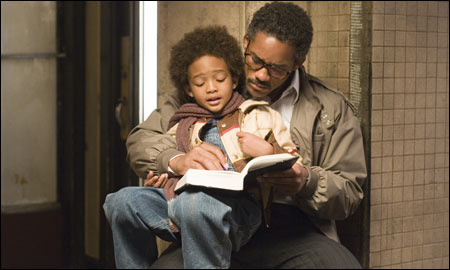Chris Gardner (Will Smith) is an energetic salesman in San Francisco who works hard to support his son, Christopher (Jaden Smith) and the boy’s mother, Linda (Thandie Newton). Gardner invested all his money in a portable medical scanner scheme but now is unable to sell all the equipment. It takes all the money the couple can scrape together to keep their son in a day care center in Chinatown.

Discouraged, Linda moves out and an almost incredible series of events conspires to send Gardner and his son first to a welfare motel, then, at Gardner’s lowest point, to the smelly men’s room in a BART station to spend the night. After this, Will runs daily from his position as an (unpaid) apprentice at an investment firm to pick up Christopher in order to get in line at a homeless shelter; they don’t always make it.
Will Smith was nominated this morning for a Golden Globe for Best Actor in a Drama, and he deserves it (so does his son, Jaden; this little apple fell very close to the tree!), though I have pinned my hopes on Leonardo DiCaprio and either role will do (in The Departed or Blood Diamond).
The good thing about this film for viewers, who are concerned about social issues and the safety and care of their brothers and sisters, is that this is a visceral experience, this based-on-a-true story, that shows of how easy it is for someone, for families, to become homeless in America. It is more often not so much the fault of individuals as it is of a system that can frustrate every attempt to become solvent. True, Gardner gets caught for not paying old parking tickets and thus loses his apartment because he literally runs out of money, but this is small compared tothe broader systemic issues involved.
This is a film about character, about perseverance, and fatherhood.

The challenging aspect of the film is that despite Will Smith’s charm (I have heard that he is next in line to take Tom Hanks’ place as the most trusted actor on the silver screen), is that as a film, the Pursuit of Happyness is an emotional downer. My head appreciates it, but I felt so much angst building up as the minutes ticked by, that I couldn’t wait for it to finish. I think the audience deserves more than a few sentences on the screen at the end telling us how Chris Gardner and his son fared after the time framed by the film ends. The brief moments of humor are perhaps realistic, but we are used to a little more emotional realism in the form of two or three minutes of “where they are now” from a film; this would not have detracted from the story, but truthfully enhanced it.
The physical landscape of the film is made up of the steep hills of San Francisco, hills that Gardner is always climbing; the metaphor for figuring out life is the Rubik Cube (that Will Smith really did learn how to solve in record time; however, it is a prop to set the era in which the film takes place rather than something that actually happened in Gardner’s life.) The intellectual landscape is, of course, the pursuit of life, liberty, and the pursuit of happiness, the American dream.
The film is directed by Gabriele Muccino, an Italian. Why an international director rather than an American? According to one of the producers Muccino said it best: because only an outsider can really appreciate what the pursuit of the American dream looks like. I think this isa fascinating take on what could be a risky film.
Fatherhood is quite a theme this holiday season: The Nativity Story, The Pursuit of Happyness, and Rocky Balboa. I hope audiences will appreciate this and take in these films as a way to enrich our spiritual lives and care for others.




No comments:
Post a Comment